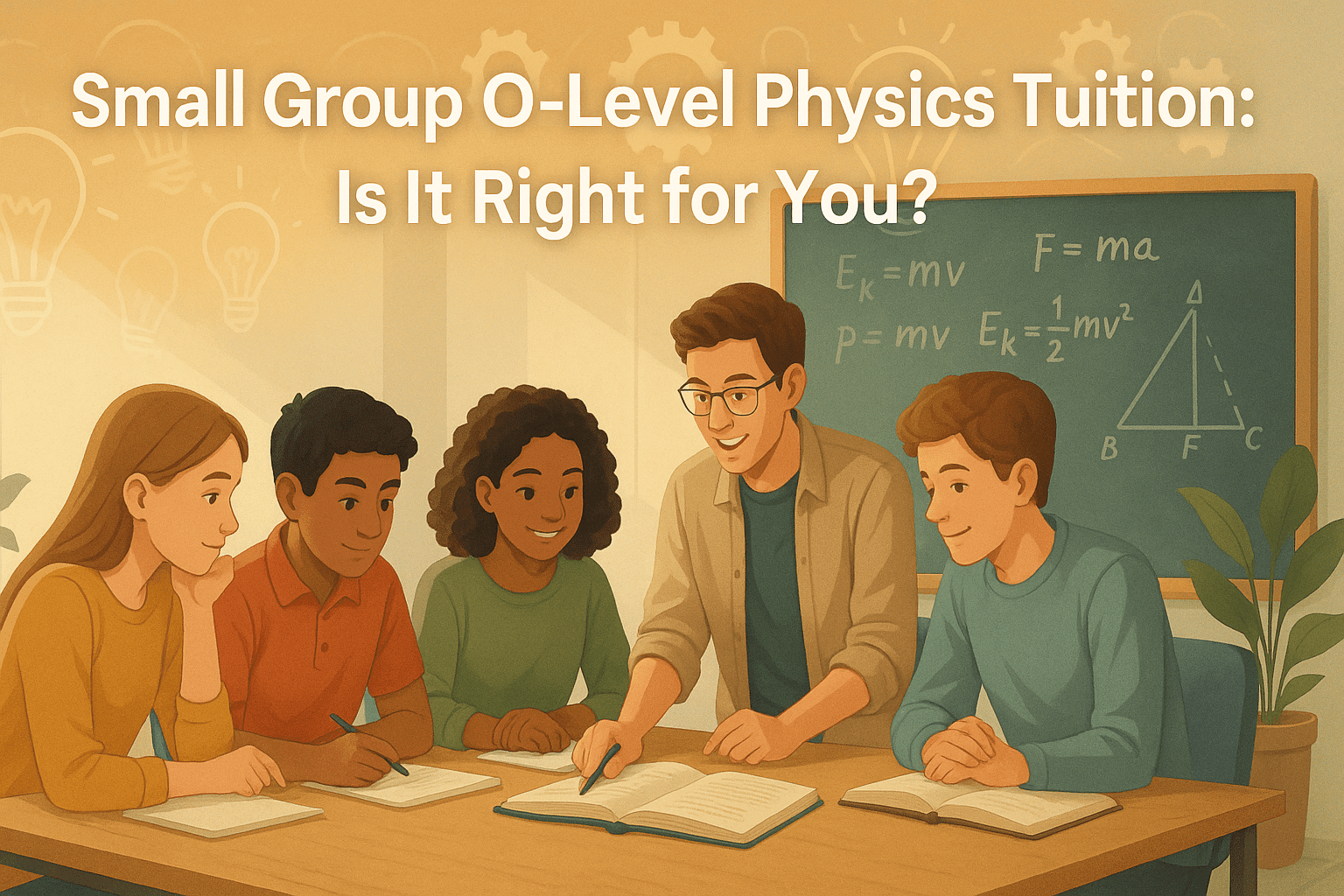Small Group O-Level Physics Tuition: Is It Right for You?
Choosing the right type of tuition can make a huge difference for students preparing for their O-Level Physics exams.
With so many options available — from private one-to-one tutors to large tuition centres — parents and students often find themselves wondering which format will bring the best results. Among these, small group tuition has been steadily gaining traction.
But is small group tuition really the right fit for every learner? To answer that question, we need to go beyond the surface and look at how these classes work, what benefits they offer, and what challenges they might bring.
In this blog post, we’ll explore the intricacies of small group O-Level Physics tuition so you can make an informed decision that truly matches your needs.
What is Small Group O-Level Physics Tuition?

Source: Unsplash
Small group tuition refers to lessons conducted in a classroom-like setting but with significantly fewer students — typically between three and eight learners.
Unlike larger tuition centres, these classes are designed to strike a balance: they provide the structure of group learning while still giving each student more attention than they would usually get in a big class.
At centres like T&T Learning Hub, for instance, the founders themselves are the tutors. They teach physics in small groups, ensuring that every learner receives professional guidance directly from experienced subject specialists.
With around eight students per class, the focus remains on personalised instruction while still encouraging students to learn alongside peers.
This format creates a middle ground between one-on-one tuition and full-sized classes. It’s not as intensive as individual tutoring, but it is far more engaging than sitting in a crowded room with 20 or more students. For many families, it feels like the “best of both worlds” approach.
Benefits of Small Group Tuition
The growing popularity of small group tuition isn’t just a trend — it’s grounded in clear advantages. Let’s take a closer look at why this format is appealing to so many students preparing for their O-Level Physics exams.
1. Personalised Attention
In smaller groups, tutors are better able to identify each student’s strengths and weaknesses. For instance, if a student consistently struggles with topics such as electricity or kinematics, the tutor can step in quickly to address these gaps.
While the attention may not be as focused as in one-to-one sessions, the manageable group size ensures no student gets completely overlooked. This balance often works well for students who need support but don’t necessarily require intensive hand-holding.
2. Peer Learning
Physics can sometimes feel abstract, and tackling it alone may become overwhelming. Small group settings naturally create opportunities for peer learning, where students can:
2. Discuss different problem-solving methods, especially for questions that allow multiple approaches.
3. Reinforce their own understanding by explaining concepts to one another.
This collaborative environment fosters curiosity, encourages discussion, and allows learners to see that they are not alone in their struggles.
Sometimes, hearing a peer explain a concept in their own words can make the material suddenly “click” in ways a formal explanation might not.
3. Increased Motivation
It’s easy to lose momentum when studying alone. In a small group, however, students often feel encouraged to stay engaged because of the shared energy in the room.
They become more accountable — if everyone else is completing assignments and actively participating, they are more likely to follow suit.
This peer-driven motivation can be especially powerful in preparing for a demanding exam like O-Level Physics, where consistent effort is key.
4. Cost-Effective
Cost is always a consideration for families. One-on-one tuition, while highly personalised, can be significantly more expensive. Small group classes often provide a sweet spot: parents get the assurance of targeted learning without the high price tag of private tuition.
Potential Drawbacks
Of course, no tuition format is without its limitations. Small group tuition, while effective for many, may not be ideal for every learner. Understanding the possible downsides can help you weigh your options more realistically.
1. Less Individual Focus
Even in groups of eight or fewer, tutors cannot devote the same undivided attention that a one-on-one lesson offers.
Students who require very intensive guidance — for example, those who are several grades behind or need constant monitoring — may find small group lessons insufficient.
2. Group Dynamics
The learning environment in small group tuition heavily depends on the dynamics of the group.
If the group is collaborative, respectful, and eager to learn, the experience is often highly productive. But if certain students dominate discussions, or if others are disruptive, it can affect the flow of the class.
Good tutors usually manage this well, but it’s still something to bear in mind.
3. Pace of Learning
Physics is a subject where some students grasp concepts quickly while others need repeated reinforcement. In a small group, the tutor often teaches at a pace that matches the “average” of the group.
This may feel too fast for some or too slow for others. While adjustments are possible, there will always be a need for compromise.
Factors to Consider When Choosing Tuition
So how do you decide whether small group tuition is the right choice for you or your child? Here are some practical points to consider:
1. Learning Style – Ask yourself: do you learn better in interactive settings, where you can discuss and ask questions, or do you prefer quiet, individual study? Small group tuition suits learners who thrive on interaction and benefit from discussion.
2. Academic Goals – What are your specific targets for O-Level Physics? If you’re aiming for a jump from an average grade to a distinction, you might need to evaluate whether the group pace will be enough to push you there.
3. Budget Considerations – For families mindful of costs, small group tuition often provides excellent value, balancing affordability with quality teaching.
4. Tutor Expertise – Always research the tutor’s qualifications and teaching style. Since the tutor is the backbone of the class, their ability to simplify complex physics concepts and engage students will directly affect results.
Conclusion
Small group O-Level Physics tuition is a strong contender for students who want a balance between individualised guidance and peer-based learning.
With class sizes small enough to ensure personal attention but dynamic enough to encourage collaboration, it offers a unique pathway to mastering physics concepts ahead of the O-Level exams.
That said, it’s not a one-size-fits-all solution. Students who need very intensive help or who prefer working alone may find greater benefit in one-on-one tuition or independent study.
The key is to evaluate personal learning preferences, academic goals, and budget before making a decision.
Ultimately, the right tuition choice is the one that aligns best with a student’s needs and helps them feel confident walking into the exam hall.
For many, small group classes — especially those run by experienced tutors who are invested in their students’ success — can be exactly what they need to bridge knowledge gaps and build exam readiness.
FAQs
1. How do I find a good small group O-Level Physics tutor?
Look for tutors with strong credentials and positive reviews from past students. Personal recommendations and trial classes can also help ensure a good fit.
2. Can small group tuition help improve my grades significantly?
Yes, with the right tutor and group dynamics, small group tuition can enhance understanding and performance, potentially leading to improved grades.
3. What if I don’t get along with the other students in the group?
Open communication with your tutor can help address any issues with group dynamics. Sometimes, switching groups might be necessary to ensure a conducive learning environment.

